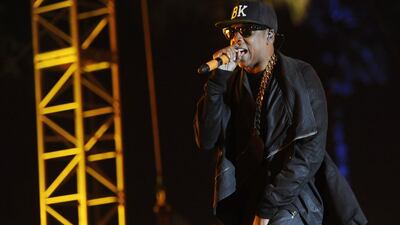A few days ago, a friend emailed me to relay a few snippets of dialogue and some storylines from a popular television comedy. “Isn’t this your material?” he asked.
It was my material. Not entirely verbatim, of course. It was cribbed from a television series I wrote a few years ago, but the similarity was unmistakable. My friend had the standard Hollywood advice.
“You should sue them,” he said. My friend, I don’t need to point out, is a lawyer who specialises in litigation.
“For what?” I asked. “Whoever wrote that script probably doesn’t even remember seeing my show all those years ago. It’s just something that was lodged in his memory. My show was cancelled after 10 episodes. His show is a giant hit.”
My attitude about this kind of plagiarism is philosophical. In the giant mill of Hollywood – where scripts and stories and songs and ideas get tossed around constantly – it’s impossible to keep track of who came up with what first.
For instance, it’s highly unlikely that Jay Z and Abdel Halim Hafez, Egyptian movie star and singer from the 1950s, have many things in common. Their lives and work don’t seem to have intersected at all. Jay Z was born in 1969. Hafez died in 1977. Jay Z specialises in profane and sexually explicit rap lyrics. Hafez sang popular Egyptian love songs and ballads, many with roots deep in Arab folk culture.
And yet, a California judge has ruled that Jay Z’s breakout hit, Big Pimpin’, is close enough to one of Hafez’s most famous songs, Khosara Khosara, to justify a full legal proceeding. The heirs of the composer of Khosara Khosara, Baligh Hamdy, are pressing on with a lawsuit. The issue here is the process known as “sampling” – in which fragments of recorded songs and melodic hooks are isolated and repurposed, mostly without compensation, in other works.
Most people call this “stealing”, of course. But in the contemporary music business, where nearly every recorded song has been digitised and catalogued and is available at the click of a mouse, producers and stars prefer to use a more genteel word. They “sample” other people’s work. They “refresh” it and deliver it to a “younger and hipper” audience.
Stealing – or maybe it’s nicer to say “borrowing without attribution” – seems to be happening a lot in the music business. The pop star Sam Smith was forced to share the royalties of his hit 2014 song Stay With Me with ageing rock star Tom Petty, whose 1989 song I Won’t Back Down sounds a whole lot like it. The two recording stars never went to court – they settled the issue in the typical Hollywood way, by hiring teams of lawyers to wrangle and haggle with each other in a conference room somewhere – but that’s probably because the two songs sound so much alike it really wasn’t worth disputing the fact.
That was probably a wise move. When Robin Thicke and his co-writer Pharrell Williams were sued by the estate of the late R&B star Marvin Gaye – they were accused by the estate of lifting large portions of Gaye’s song, Got to Give it Up, and using them in their 2014 smash hit, Blurred Lines – they insisted that the dispute go to trial. A jury listened to both songs and decided that, yes, Thicke and Pharrell ripped off the tune and owed the Gaye estate millions.
Smith, Thicke, and Williams all insist that any similarities between their hits and the earlier songs are – if they even exist – utterly coincidental and the product of some kind of subconscious memory at work. They’ve all heard so many songs and so many melodies that it’s understandable that some of their new stuff is going to come out sounding a lot like someone else’s old stuff.
Jay Z and his producer, Timbaland, don’t dispute that they “sampled” the song. It’s immediately obvious to anyone – the signature hook of Khosara Khosara as it was recorded by Abdel Halim Hafez is repeated throughout Big Pimpin’. What they dispute, though, is that they have anything to apologise for or anyone to compensate.
It’s an odd sort of defence. Music producers who “sample” other people’s material seem to suggest that it’s more honorable to take a piece of recorded music – the work product of composers, singers, sound engineers and musicians – and plop it down in something new than it is for, say, Sam Smith to hear a Tom Petty tune years ago and then sit down a decade later and write something similar by mistake.
I take the opposite view. “Sampling”, to me anyway, seems like outright and brazen theft. What the other three musicians are accused of seems closer to a kind of thoughtless laziness. And I should be the last person on Earth to condemn anyone else for laziness.
“And that’s why I won’t sue,” I told my lawyer friend. “That show borrowed my material, but at least they didn’t sample it.”
My lawyer friend was disappointed. He was itching, I guess, for a juicy lawsuit. But he’s in the wrong area of the entertainment business. Comedy writers don’t sample.
Rob Long is a writer and producer based in Hollywood
On Twitter: @rcbl

